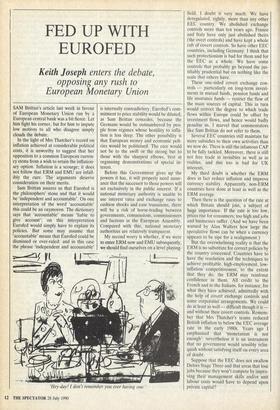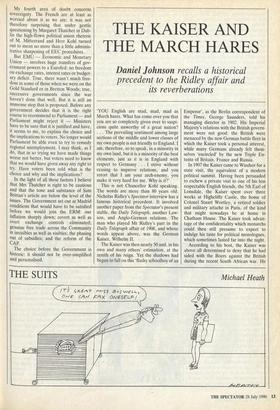FED UP WITH EUROFED
Keith Joseph enters the debate, opposing any rush to European Monetary Union
SAM Brittan's article last week in favour of European Monetary Union run by a European central bank was a bit fierce. Let him fight his corner, but for him to impute low motives to all who disagree simply clouds the debate.
In the light of Mrs Thatcher's record on inflation achieved at considerable political costs, it is unworthy to suggest that her opposition to a common European curren- cy stems from a wish to retain the inflation- ary option. Inflation is a scourge; it does not follow that ERM and EMU are infall- ibly the cure. The arguments deserve consideration on their merits.
Sam Brittan assures us that Eurofed is the philosophers' stone and that it would be Independent and accountable'. On one interpretation of the word `accountable' this could be an oxymoron. The dictionary says that `accountable' means `liable to give account': on this interpretation Eurofed would simply have to explain its policies. But some may assume that `accountable' means that Eurofed could be dismissed or over-ruled: and in this case the phrase Independent and accountable' is internally contradictory. Eurofed's com- mitment to price stability would be diluted, as Sam Brittan concedes, because the Germans would be outnumbered by peo- ple from regimes whose hostility to infla- tion is less deep. The other possibility is that European money and economic poli- cies would be politicised. The race would not be to the swift or the strong but to those with the sharpest elbows, best at organising demonstrations of special in- terest.
Before this Government gives up the powers it has, it will properly need assur- ance that the successor to those powers will act exclusively in the public interest. If a national monetary authority is unable to use interest rates and exchange rates to cushion shocks and ease transitions, there will be a risk of horse-trading between governments, commissions, commissioners and factions in the European Assembly. Compared with this, national monetary authorities are relatively transparent.
My second worry is whether, if we were to enter ERM now and EMU subsequently, we should find ourselves on a level playing- 'Hey-day! I don't remember you ever having one.' field. I doubt it very much. We have deregulated, rightly, more than any other EEC country. We abolished ' exchange controls more than ten years ago. France and Italy have only just abolished theirs (the overt controls) and have kept a whole raft of covert controls. So have other EEC countries, including Germany. I think that such protectionism is bad for them and for the EEC as a whole. We have some controls that probably go beyond the jus- tifiably prudential but on nothing like the scale that others have.
These one-sided covert exchange con- trols — particularly on long-term invest- ments in mutual funds, pension funds and life insurance funds — restrict the flow of the main sources of capital. This in turn would restrict the degree to which trade flows within Europe could be offset by investment flows, and hence would badly penalise us. I marvel that commentators like Sam Brittan do not refer to them.
Several EEC countries still maintain far more subsidies to their own activities than we now do. There is still the infamous CAP to be fully tackled. Moreover, there is still not free trade in invisibles as well as in visibles, and this too is bad for UK interests.
My third doubt is whether the ERM does in fact reduce inflation and improve currency stability. Apparently, non-ERM countries have done at least as well as the ERM average.
Then there is the question of the rate at which Britain should join, a subject of huge importance. If the rate is too low, prices rise for consumers; too high and jobs and businesses suffer. (And we have been warned by Alan Walters how large the speculative flows can be when a currency appears to be ripe for a realignment.)
But the overwhelming reality is that the ERM is no substitute for correct policies by the country concerned. Countries have to have the resolution and the techniques to achieve profitable, high-employment, low- inflation competitiveness; to the extent that they do, the ERM may reinforce confidence in them. All credit to the French and to the Italians, for instance, for what they have achieved, admittedly with the help of covert exchange controls and some corporatist arrangements. We could do at least as well — difficult though it is and without their covert controls. Remem- ber that Mrs Thatcher's teams reduced
British inflation to below the EEC average rate in the early 1980s. Years ago 1
emphasised that `monetarism is not enough': nevertheless it is an instrument that no government would sensibly relin- quish without satisfying itself on every area of doubt.
Suppose that the EEC does not swallow Delors Stage Three and that areas that lose jobs because they won't compete by impro- ving their management skills and/or unit labour costs would have to depend upon private capital? My fourth area of doubt concerns sovereignty. The French are at least as worried about it as we are: it was not therefore surprising that under gentle questioning by Margaret Thatcher in Dub- lin the high-flown political union rhetoric of M. Mitterrand and Herr Kohl turned out to mean no more than a little adminis- trative sharpening of EEC procedures.
But EMU — Economic and Monetary Union — involves huge transfers of gov- ernment powers to a Eurofed: no freedom on exchange rates, interest rates or budget- ary deficit. True, there wasn't much free- dom in some of those when we were on the Gold Standard or in Bretton Woods; true, successive governments since the war haven't done that well. But it is still an immense step that is proposed. Before any government decides that it is the right
course to recommend to Parliament — and Parliament might reject it — Ministers
have to be sure that it is justified and have, it seems to me, to explain the choice and the implications to voters. No longer would Parliament be able even to try to remedy regional unemployment. I may think, as I do, that in so trying we have made things worse not better, but voters need to know that we would have given away any right to try. Have voters been told what is the choice and why and the implications?
In the light of all these factors I believe that Mrs Thatcher is right to be cautious and that the tone and substance of Sam Brittan's article are below the level of the issues. The Government set out at Madrid conditions that would have to be satisfied before we would join the ERM: our inflation sharply down; covert as well as overt exchange controls eliminated; genuine free trade across the Community in invisibles as well as visibles; the phasing out of subsidies; and the reform of the CAP.
The choice before the Government is historic: it should not be over-simplified and personalised.



















































 Previous page
Previous page